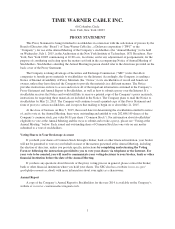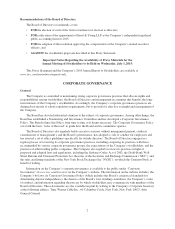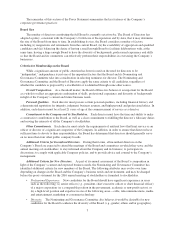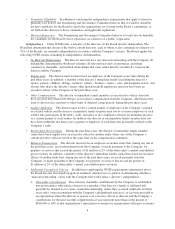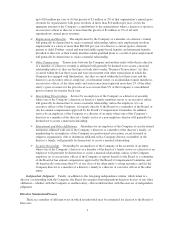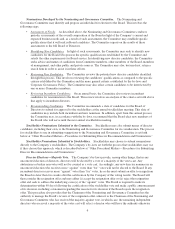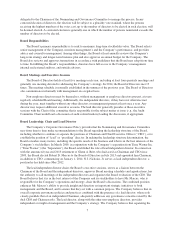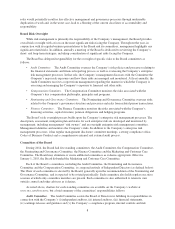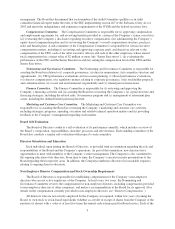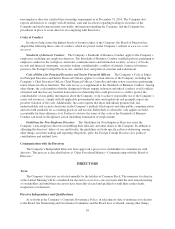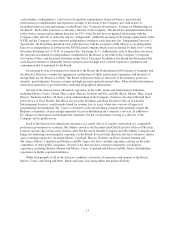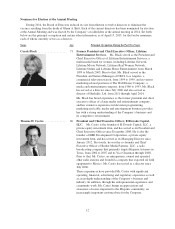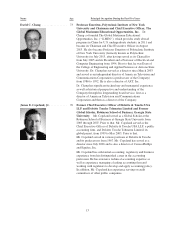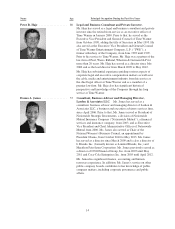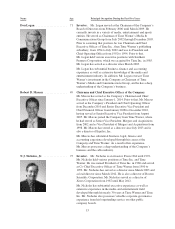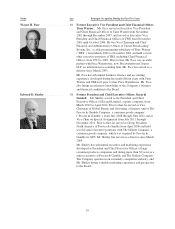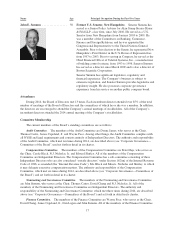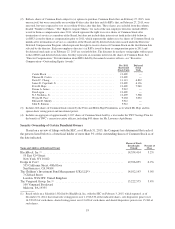Time Warner Cable 2015 Annual Report Download - page 16
Download and view the complete annual report
Please find page 16 of the 2015 Time Warner Cable annual report below. You can navigate through the pages in the report by either clicking on the pages listed below, or by using the keyword search tool below to find specific information within the annual report.non-employee directors satisfied this ownership requirement as of December 31, 2014. The Company also
expects all directors to comply with all federal, state and local laws regarding trading in securities of the
Company and disclosing material, non-public information regarding the Company, and the Company has
procedures in place to assist directors in complying with these laws.
Codes of Conduct
In order to help assure the highest levels of business ethics at the Company, the Board of Directors has
adopted the following three codes of conduct, which are posted on the Company’s website at www.twc.com/
investors.
Standards of Business Conduct. The Company’s Standards of Business Conduct apply to the Company’s
employees, including any employee directors. The Standards of Business Conduct establish policies pertaining to
employee conduct in the workplace, electronic communications and information security, accuracy of books,
records and financial statements, securities trading, confidentiality, conflicts of interest, fairness in business
practices, the Foreign Corrupt Practices Act, antitrust laws and political activities and solicitations.
Code of Ethics for Principal Executive and Senior Financial Officers. The Company’s Code of Ethics
for Principal Executive and Senior Financial Officers applies to certain officers of the Company, including the
Company’s Chief Executive Officer, Chief Financial Officer, Controller and other senior executives performing
senior financial officer functions. The code serves as a supplement to the Standards of Business Conduct. Among
other things, the code mandates that the designated officers engage in honest and ethical conduct, avoid conflicts
of interest and disclose any material transaction or relationship that could give rise to a conflict, protect the
confidentiality of non-public information about the Company, work to achieve responsible use of the Company’s
assets and resources, comply with all applicable governmental rules and regulations and promptly report any
possible violation of the code. Additionally, the code requires that these individuals promote full, fair,
understandable and accurate disclosure in the Company’s publicly filed reports and other public communications
and sets forth standards for accounting practices and records. Individuals to whom the code applies are held
accountable for their adherence to it. Failure to observe the terms of this code or the Standards of Business
Conduct can result in disciplinary action (including termination of employment).
Guidelines for Non-Employee Directors. The Guidelines for Non-Employee Directors assist the
Company’s non-employee directors in fulfilling their fiduciary and other duties to the Company. In addition to
affirming the directors’ duties of care and loyalty, the guidelines set forth specific policies addressing, among
other things, securities trading and reporting obligations, gifts, the Foreign Corrupt Practices Act, political
contributions and antitrust laws.
Communication with the Directors
The Company’s Independent Directors have approved a process for stockholders to communicate with
directors. This process is described below at “Other Procedural Matters—Communicating with the Board of
Directors.”
DIRECTORS
Term
The Company’s directors are elected annually by the holders of Common Stock. The nominees for director
at the Annual Meeting will be considered for election to serve for a one-year term until the next annual meeting
of stockholders and until their successors have been duly elected and qualified or until their earlier death,
resignation or retirement.
Director Independence and Qualifications
As set forth in the Company’s Corporate Governance Policy, in selecting its slate of nominees for election
to the Board, the Nominating and Governance Committee and the Board have evaluated, among other things,
10



